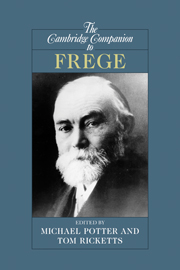Book contents
- Frontmatter
- 1 Introduction
- 2 Understanding Frege’s project
- 3 Frege’s conception of logic
- 4 Dummett’s Frege
- 5 What is a predicate?
- 6 Concepts, objects and the Context Principle
- 7 Sense and reference: the origins and development of the distinction
- 8 On sense and reference: a critical reception
- 9 Frege and semantics
- 10 Frege’s mathematical setting
- 11 Frege and Hilbert
- 12 Frege’s folly: bearerless names and Basic Law V
- 13 Frege and Russell
- 14 Inheriting from Frege: the work of reception, as Wittgenstein did it
- Bibliography
- Index
- Series List
9 - Frege and semantics
Published online by Cambridge University Press: 28 September 2010
- Frontmatter
- 1 Introduction
- 2 Understanding Frege’s project
- 3 Frege’s conception of logic
- 4 Dummett’s Frege
- 5 What is a predicate?
- 6 Concepts, objects and the Context Principle
- 7 Sense and reference: the origins and development of the distinction
- 8 On sense and reference: a critical reception
- 9 Frege and semantics
- 10 Frege’s mathematical setting
- 11 Frege and Hilbert
- 12 Frege’s folly: bearerless names and Basic Law V
- 13 Frege and Russell
- 14 Inheriting from Frege: the work of reception, as Wittgenstein did it
- Bibliography
- Index
- Series List
Summary
FREGE AND THE JUSTIFICATION OF LOGICAL LAWS
In recent work on Frege, one of the most salient issues has been whether he was prepared to make serious use of semantic notions such as reference and truth. Those not familiar with this debate are often surprised to hear of it. Surely, they say, Frege's post-1891 writings are replete with uses of 'true' and 'refers'. But no one wants to deny that Frege makes use of such terms: Rather, what is at issue is how Frege understood them; more precisely, what is at issue is whether Frege employed them for anything like the purposes for which philosophers now employ them. What these purposes are, or should be, is itself a matter of philosophical dispute, and, although I shall discuss some aspects of this issue, my goal here is not to address it directly. My purpose here, rather - one of them, anyway - is to argue that Frege did make very serious use of semantic concepts: In particular, he offered informal mathematical arguments, making use of semantic notions, for semantic claims. For example, he argues that all of the axioms of the Begriffsschrift - the formal system in which he proves the basic laws of arithmetic - are true, that its rules of inference are truth-preserving, and that every well-formed expression in Begriffsschrift has been assigned a reference by the stipulations he makes about the references of its primitive expressions.
Let me say at the outset that Frege was not Tarski and did not produce, as Tarski did, a formal semantic theory, a mathematical definition of truth. But that is not of any significance here. One does not have to provide a formal semantic theory to make serious use of semantic notions. At most, the question is whether Frege would have been prepared to offer such a theory, or whether he would have accepted the sort of theory Tarski provided (or some alternative), had he known of it. On the other hand, the issue is not whether Frege would have accepted Tarski’s theory of truth, or Gödel ’ s proof that first-order logic is complete, as a piece of mathematics; it is whether he would have taken these results to have the kind of significance we (or at least some of us) would ascribe to them. Tarski’s argument in ‘The concept of truth in formalized languages’ shows that all axioms of the calculus of classes are true; the completeness theorem shows that every valid first-order schema is provable in certain formal systems.
- Type
- Chapter
- Information
- The Cambridge Companion to Frege , pp. 342 - 378Publisher: Cambridge University PressPrint publication year: 2010
- 8
- Cited by

